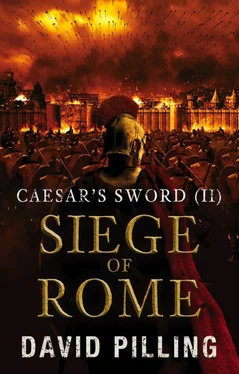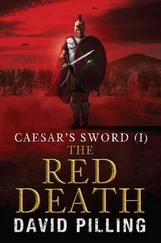David Pilling - Siege of Rome
Здесь есть возможность читать онлайн «David Pilling - Siege of Rome» весь текст электронной книги совершенно бесплатно (целиком полную версию без сокращений). В некоторых случаях можно слушать аудио, скачать через торрент в формате fb2 и присутствует краткое содержание. Год выпуска: 2013, Жанр: Исторические приключения, на английском языке. Описание произведения, (предисловие) а так же отзывы посетителей доступны на портале библиотеки ЛибКат.
- Название:Siege of Rome
- Автор:
- Жанр:
- Год:2013
- ISBN:нет данных
- Рейтинг книги:3 / 5. Голосов: 1
-
Избранное:Добавить в избранное
- Отзывы:
-
Ваша оценка:
- 60
- 1
- 2
- 3
- 4
- 5
Siege of Rome: краткое содержание, описание и аннотация
Предлагаем к чтению аннотацию, описание, краткое содержание или предисловие (зависит от того, что написал сам автор книги «Siege of Rome»). Если вы не нашли необходимую информацию о книге — напишите в комментариях, мы постараемся отыскать её.
Siege of Rome — читать онлайн бесплатно полную книгу (весь текст) целиком
Ниже представлен текст книги, разбитый по страницам. Система сохранения места последней прочитанной страницы, позволяет с удобством читать онлайн бесплатно книгу «Siege of Rome», без необходимости каждый раз заново искать на чём Вы остановились. Поставьте закладку, и сможете в любой момент перейти на страницу, на которой закончили чтение.
Интервал:
Закладка:
“We met the Moors on a fair open field and utterly routed them. You know what poor soldiers they make. They wear no armour, and their flimsy shields and javelins were no match for Roman arms. I followed up, hoping to destroy the survivors, and found them entrenched in a strong position on Mount Burgaon. I threw in our infantry, and in one assault they cleared the trenches and drove the Moors like sheep, until the desert ran red with their tainted blood.”
“So far, a textbook campaign,” murmured Belisarius, “what went wrong?”
Solomon laid his head back on the pillows and closed his eyes. “The tribes retreated into the recesses of the desert, where we could not follow,” he said, “and then our men started to disintegrate. I did not realise until it was too late, but the army was rotten with sedition. Most of the protestors were Arians. The heresy is still strong in Africa. They complained of Justinian’s harsh edits against their faith, and that they were barred from baptizing their children. They complained that the plunder taken from the defeated Moors was not shared out equally. They complained of these and other matters with loud and bitter voices, and the disaffection quickly spread among our orthodox troops. Meanwhile the Moors were allowed to recover their strength.”
It was now that Solomon’s failure became apparent. As governor and commander-in-chief, he should have stamped down hard on the dissenting voices. Belisarius was of a naturally merciful disposition, but had never hesitated from applying old-fashioned Roman discipline when necessary. I remember the pair of drunken Hunnish confederates he had executed on the hills above Heraclea, and their headless bodies tossed into the sea.
“Unknown to me, some of our garrison troops met at Mount Auras,” said Solomon, “and there formed a pact with the Moors and the worst of the Arian dissenters. They raised the standard of revolt against Roman rule. At the same time, a ship bearing four hundred Vandals taken captive in the recent wars was on its way to our eastern provinces. The Vandals were supposed to enlist in our armies there. As the ship sailed past the African coast, the Vandals rose in revolt, slaughtered the sailors and marines, and forced the captain to land. They joined with the rebels at Mount Auras.”
He passed a hand over his face. “The Arian poison had even spread to Carthage. Some of the fanatics there plotted against my life, and chose Easter as the best time to murder me. They planned to have me killed as I entered the cathedral before the ceremony. However, when news reached them of the rebel host gathered at Mount Auras, they threw aside all caution and forswore their allegiance to Rome.”
Belisarius could contain himself no longer. “And what in the hells were you doing, while all this was going on?” he demanded through gritted teeth.
I had never seen him so angry. His sallow cheeks had turned the colour of fresh steak, and his fists were clenched until the bony knuckles turned white. A thick blue vein throbbed dangerously on his forehead.
“I was planning to march on the rebels, sir,” Solomon replied hastily, “but the conspiracy in Carthage took me by surprise. The Arians took to the streets at night. They smashed and plundered the houses of wealthy citizens and slaughtered all in their path, regardless of age, rank or degree. I tried to raise the garrison to sally out against them, but our men were seized with terror, and refused to move. When the mutineers forced the doors of the palace, I was obliged to flee for my life, and take refuge in a chapel. Procopius and a few loyal attendants fled with me. When dawn broke, and the mutineers were drowsy with wine and murder, we crept down to the harbour and stole a boat.”
“And so came here,” said Belisarius. He pressed his fingertips together and held them to his lips for a moment. I watched him in silence, wondering what even that superb military mind could conceive to reverse such a disaster.
“How many of our ships are ready to sail immediately?” he asked suddenly.
“Just your flagship, sir,” I replied, “the rest of our fleet is either being re-fitted, or scattered among the other Sicilian ports.”
Just for a second, the briefest of seconds, I thought his resolution faltered. A shadow crawled over his face, but then vanished.
“My galley can carry no more than a hundred men,” he said briskly, “but that will have to do. We sail for Carthage. Now.”
He turned on his heel and strode to the door. I and my fellow guardsman exchanged panicked glances and hurried after him down the corridor outside.
“Sir,” I cried, struggling to keep pace with his long legs, “forgive my presumption, but how can you hope to retake North Africa with just a hundred men?”
Belisarius didn’t even break step. “No questions, Coel,” he snapped, “my forebears never brooked questions from their subordinates. I should have you flogged. My God, would the likes of Agrippa or Agricola have put up with junior officers bleating at them? Roman discipline is much decayed.”
In this mood, it was impossible to tell if he was joking. “Summon my personal guard,” he added, “I will take a hundred of the best with me. Once we reach Carthage, I will call upon the garrison to join me. I left two thousand men to defend the city. More than enough.”
A host of objections flew to my lips, and stayed there. I knew the general was fond of me, and also knew that he would have the skin flayed off my back if I irked him any further. Leaving him to bellow for his armour, I ran down to the barracks to rouse his guard.
We hurriedly assembled on the drill-yard outside the palace. Belisarius soon appeared, buckling on his breastplate and trailed by a group of officers, including Photius. The godlike young man looked immaculate in a gleaming silver breastplate and plumed helm, as though he had been waiting in his armour for the order to march.
His personal guard were formed into an old-fashioned maniple or cohort of five hundred men, divided into six centuries of eighty men each. They were the cream of his Veterans and bucelarii, or men like me who had performed well enough in past campaigns to be admitted to their ranks. Above all, we were men Belisarius felt he could trust on the battlefield and off it.
“First Century, with me,” he shouted as our men tumbled into line, “the rest, dismissed.”
I was technically appointed to the Third Century, but there was no question of me staying behind.
The eighty men of the First followed the general as he hurried down to the docks. There were a few Egyptian sailors lounging near the jetty where Belisarius’ ship was moored. He pressed these unfortunates into service, roaring at them to get aboard and make ready to sail, if they valued their lives. Abandoning their games of dice, the Egyptians scrambled aboard the galley and started hauling on ropes.
We followed, pounding in double file up the gangplank. It felt as though I had barely drawn breath since Belisarius threatened to have me flogged. The wind was set fair, and my stomach gave a lurch as the mainsail billowed and the steersman turned the ship’s prow south.
Over a hundred miles of open sea lay between Syracuse and Carthage. Our ship sped through the sparkling blue waters like a dolphin, propelled by Heaven-sent winds and the fierce will of Belisarius. He stood at the prow, jaw clenched, eyes fixed on the western horizon.
Meanwhile I clung to the side and emptied my breakfast into the sea. I hated myself for showing such weakness, especially in front of my comrades, even though they tactfully looked away.
“God preserve my strength,” I muttered between dry heaves, touching the hilt of Caledfwlch for luck. I would need all of my grandsire’s warlike skill and resolve when we reached Carthage.
Читать дальшеИнтервал:
Закладка:
Похожие книги на «Siege of Rome»
Представляем Вашему вниманию похожие книги на «Siege of Rome» списком для выбора. Мы отобрали схожую по названию и смыслу литературу в надежде предоставить читателям больше вариантов отыскать новые, интересные, ещё непрочитанные произведения.
Обсуждение, отзывы о книге «Siege of Rome» и просто собственные мнения читателей. Оставьте ваши комментарии, напишите, что Вы думаете о произведении, его смысле или главных героях. Укажите что конкретно понравилось, а что нет, и почему Вы так считаете.












